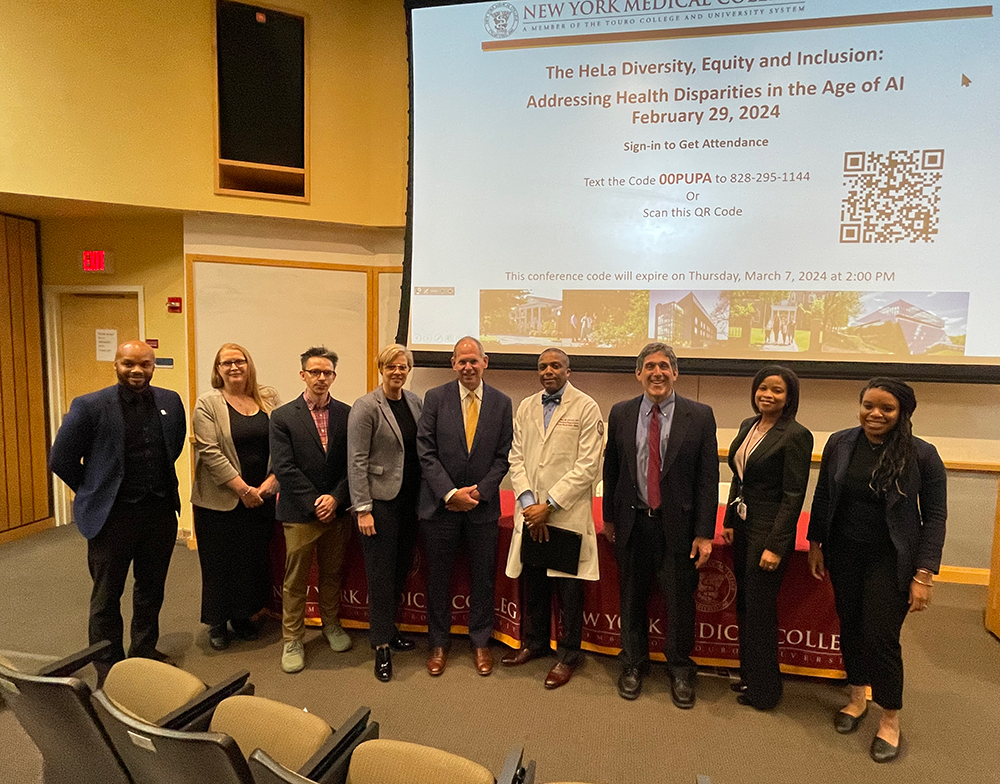
HeLa Conference Navigates the Future of AI and Health Care Equity
Panelists Explore AI’s Role in Medicine and Ethical Considerations

The New York Medical College (NYMC) Office of Diversity and Inclusion and the Westchester Medical Center Health Network (WMCHealth) jointly hosted the seventh annual HeLa Diversity, Equity and Inclusion Conference on February 29. The event, themed "Addressing Health Disparities in the Age of AI," brought together experts to delve into the relationship between artificial intelligence (AI) and health care.
“Everyone knows that there has been a huge boom of AI,” said Mill Etienne, M.D. ’02, M.P.H., FAAN, FAES, fourth from right, vice chancellor for the Office for Diversity and Inclusion, associate dean for student affairs, and associate professor of neurology and medicine. “We felt like it would be a very important time for us to talk about AI and how it could be leveraged to address health disparities and make sure that it doesn't widen those disparities.”
Panelists engaged in discussions ranging from the application of AI in various medical specialties to strategies aimed at mitigating potential bias in its use, all while emphasizing the importance of maintaining ethical standards. They eagerly explored how AI can revolutionize patient care, while ensuring inclusivity and equity in the health care landscape.
Dr. Etienne, Neil W. Schluger, M.D., center, dean of the School of Medicine and professor of medicine, and Matilde Roman, Esq., fourth from left, senior vice president and chief equity, inclusion, and diversity officer at WCMHealth, provided the opening remarks for the event.
“There's a lot of promise in our AI and creating greater efficiencies and optimization of care, delivery, and helping improve disease, diagnosis, and treatment selection,” said Roman. “But there's also a potential risk associated with the use of AI and that it can worsen the impact of biases and inequities within the health care system.”
“[This conference] addresses a very important development in medicine that I think many of us are interested in and also nervous about,” said Dr. Schluger. “I think understanding the impact of AI on many different communities is something that we need to take very seriously and work very hard on, so we don't become more interested in studying people than taking care of them.”
AI Literacy-the Nuts and Bolts
Marie T. Ascher, M.S., M.P.H., the Lillian Hetrick Huber Endowed director of the Phillip Capozzi, M.D., Library
The Landscape of AI in Medicine
Benson Babu, M.D., M.B.A., clinical assistant professor of medicine and board-certified internist specializing in hospital medicine, WMCHealth Good Samaritan Hospital
Pitfalls of AI in Pathology
Lori Anderson, M.D., chief of pathology and laboratory medicine, WMCHealth Good Samaritan Hospital and board-certified in anatomic and clinical pathology
Closing the Rehab Treatment Gap Through AI
Eric Altschuler, M.D., Ph.D., associate clinical professor in the Department of Rehabilitation Medicine and associate chief and director of clinical research in the Department of Physical Medicine and Rehabilitation, NYC Health + Hospitals/Metropolitan
AI and Quantum Computing in Minimizing Disparities in Dementia Care
Philippe Douyon, M.D. ’07, assistant professor of neurology, Seton Hall Hackensack Meridian School of Medicine
Pediatric Medicine in an AI Era
Chantel Johnson, M.D., chief resident in pediatrics, Westchester Medical Center
AI in Medicine: Closing the Gap or Increasing Disparities
Roxana Daneshjou, M.D., Ph.D., assistant professor of dermatology and assistant professor in the Department of Biomedical Data Science, Stanford University
Health Equity in the Age of AI: An Informatics Perspective
Morgan Jeffries, M.D., associate medical director for AI, Geisinger
Named in honor of Henrietta Lacks, whose unwitting contribution to science revolutionized medicine, the annual conference serves as a platform for ongoing discussions on critical issues such as research ethics, informed consent, privacy, and compensation. Lacks, tragically diagnosed with cervical cancer and passing away at just 31 years old in 1951, unknowingly provided the world with an invaluable gift. Her cancer cells, known as HeLa, was the first immortal cell line, or group of tissue samples that could survive in a lab and reproduce indefinitely, leading to advances including the polio vaccine, cancer treatments and in vitro fertilization. In 2023, Lacks’ family settled its lawsuit against biotechnology company Thermo Fisher Scientific over its claim that the company had been “unjustly enriched” by its use of her cells.
The video from the HeLa Conference and other NYMC events are available on the NYMC Youtube Channel.

